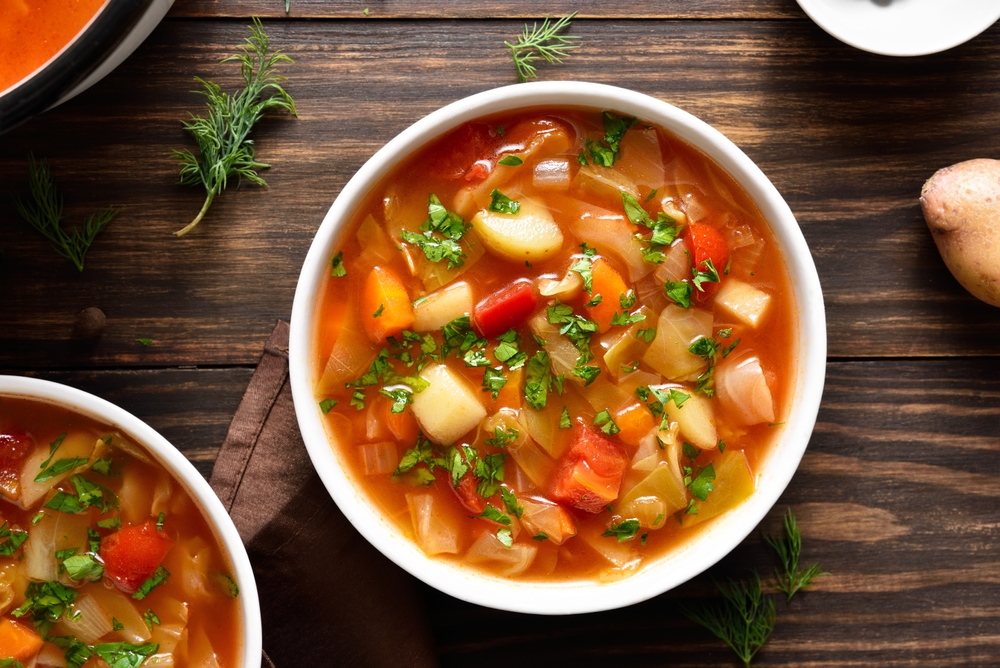Soup: Medicine for the Mind, Body, and Soul

By Dennis Archambault
I discovered the art and science of soup years ago when I was first experimenting with serious cooking on a low budget. As I wrote in a previous blog, I learned about the health benefits of a rich broth from the late Matt Prentice, who was hired by Henry Ford West Bloomfield to develop healthy, tasty entrees for the then new hospital. Prentice believed that food is indeed medicine. The “healing” comes in when a recipe incorporates vegetables and herbs that provide excess minerals and vitamins – “intensely.” For example, many of Prentice’s recipes incorporated broccoli sprouts, which have a high concentration of the antioxidant sulforaphane, into sandwiches and salads. Sulforaphane is believed to prevent and fight cancer, plus, Prentice added, broccoli sprouts are delicious. He applied this thinking to all of the recipes. To support the recipes, Prentice wrote a 48-page manual, The Health and Illness Prevention Aspects of Food, for the Henry Ford food service staff.
Who has time for slow cooking today, you might ask. Well, Bethany Thayer, a Henry Ford Health dietitian and food writer, promoted the merits of using a slow cooker for minestrone soup in a recent Detroit Free Press column. She led with a quote from the classic French culinary expert, Auguste Escoffier: “Soup puts the heart at ease, calms down the violence of hunger, eliminates the tension of the day, and awakens and refines the appetite.” Even in an era of buttery sauces, fatty meats, and rich sweets, Escoffier knew there was holistic goodness in a soup. Something to consider with the arrival of winter.
Thayer, who has provided Free Press readers with many tasty and healthy recipes through the years, elevates soup, specifically the Italian vegetable soup, “minestrone,” to the upper echelon of “food is medicine” hierarchy. She offers a five-point argument in support of this:
- Soup is basically good for you. You can draw enrichment from vegetables, fresh or frozen, especially root vegetables which are available well into the winter.
- They’re inexpensive. While Thayer says that soup is easy to prepare – and it is, compared with more complex dishes – it still takes time. With a slow cooker, though, a quick period of chopping, a container of brother or water, herbs, and, as they say, “soup’s on.” Later in the day there will be a nutritious meal waiting.
- You can make a lot of it, and it freezes well.
- They provide hydration, which may not seem to be an issue in the cold weather months, but Thayer advises us that we often drink less water than we need during the winter.
- Most importantly, soup strengthens the immune system. And if we learned anything from the COVID pandemic, we know that many Americans have compromised immune systems for several reasons. She says that soups help stave off cold and flu and are good for the body, mind, and soul when you have a cold. “Most soups are loaded with disease-fighting nutrients. In fact, studies show that chicken soup, in particular, can help prevent the common cold, especially if you load it up with fresh garlic, onions, celery and carrots.
For more information on this and other topics relating to cooking an nutrition, visit henry-ford.com/blog, or contact Thayer at HenryFordLiveWell@hfhs.org.
Dennis Archambault is vice president of Public Affairs at Authority Health.
Tags: healthy cooking, healthy eating, healthy food, home cook, nutrition, scratch cooking, soup, vegetables